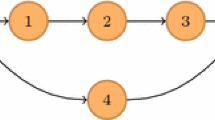Abstract
The time-dependent scheduling problems have received considerable attention recently. However, machine availability, an important and practical consideration, is usually neglected. Motivated by this observation, we introduce a single-machine scheduling problem where deteriorating jobs and an availability constraint are considered. Our objective is to minimize the total completion time. In this paper, we derived optimal and near-optimal solutions for the problem, and we also gave a simulation study to show that our algorithm successfully yields the optimal solution for instances with less than 20 jobs in less than a minute. Our computational experiment also showed that the mean error percentage of the proposed heuristic algorithm for all test instances is less than 1.3% and drops to zero as the number of jobs increases.
Similar content being viewed by others
References
Alidaee B, Womer NK (1999) Scheduling with time dependent processing times: review and extensions. Journal of the Operational Research Society 50:711–720
Bachman A, Cheng TCE, Janiak A, Ng CT (2002) Scheduling start time dependent jobs to minimize the total weighted completion time. Journal of the Operational Research Society 53(6):688–693
Browne S, Yechiali U (1990) Scheduling deteriorating jobs on a single processor. Operations Research 38:495–498
Cheng TCE, Ding Q (1998) The complexity of single machine scheduling with release times. Information Processing Letters 65(2):75–79
Cheng TCE, Ding Q (2001) Single machine scheduling with step-deteriorating processing times. Eur J Oper Res 134:623–630
Cheng TCE, Ding Q (2003) Scheduling start time dependent tasks with deadlines and identical initial processing times on a single machine. Computers and Operations Research 30(1):51–62
Cheng TCE, Ding Q, Kovalyov MY, Bachman A, Janiak A (2003) Scheduling jobs with piecewise linear decreasing processing times. Naval Research Logistics 50(6):531–554
Cheng TCE, Ding Q, Lin BMT (2004) A concise survey of scheduling with time-dependent processing times. Eur J Oper Res 152:1–13
Graves GH, Lee CY (1999) Scheduling maintenance and semi-resumable jobs on a single machine. Naval Research Logistics 46:845–863
Gupta JND, Gupta SK (1988) Single facility scheduling with nonlinear processing times. Computers and Industrial Engineering 14:387–393
Hsieh YC, Bricker DL (1997) Scheduling linearly deteriorating jobs on multiple machines. Computers and Industrial Engineering 32:727–734
Lee CY (1996) Machine scheduling with an availability constraint. J Glob Optim 9:395–419
Lee WC, Wu CC, Liu HC (2009) A note on single-machine makespan problem with general deteriorating function. Int J Adv Manuf Tech 40:1053–1056
Liu L, Gu HY, Xi YG (2007) Robust and stable scheduling of a single machine with random machine breakdowns. Int J Adv Manuf Tech 31:645–654
Ng CTD, Cheng TCE, Bachman A (2002) Three scheduling problems with deteriorating jobs to minimize the total completion time. Information Processing Letters 81(6):327–333
Shiau YR, Lee WC, Wu CC, Chang CM (2007) Two-machine flowshop scheduling to minimize mean flow time under simple linear deterioration. Int J Adv Manuf Tech 33:1237–1243
Sundararaghavan PS, Kunnathur A (1994) Single machine scheduling with start time dependent processing time: some solvable cases. Eur J Oper Res 78(3):394–403
Toksari MD, Güner E (2008) Minimizing the earliness/tardiness costs on parallel machine with learning effects and deteriorating jobs: a mixed nonlinear integer programming approach. Int J Adv Manuf Tech 38:801–808
Wang JB, Ng CTD, Cheng TCE, Liu LL (2006) Minimizing total completion time in a two-machine flow shop with deteriorating jobs. Appl Math Comput 180:185–193
Wang JB (2006) A note on scheduling problems with learning effect and deteriorating jobs. International Journal of Systems Science 37(12):827–833
Wang JB (2007) Single-machine scheduling problems with the effects of learning and deterioration. Omega 35(4):397–402
Wang JB, Cheng TCE (2007) Scheduling problems with the effects of deterioration and learning. Asia-Pacific Journal of Operational Research 24(2):245–261
Wang JB, Ng CTD, Cheng TCE (2008) Single-machine scheduling with deteriorating jobs under a series-parallel graph constraint. Computers and Operations Research 35(8):2684–2693
Wang JB, Xia ZQ (2006) Flow shop scheduling with deteriorating jobs under dominating machines. Omega 34:327–336
Wang JB (2009) Single machine scheduling with a time-dependent learning effect and deteriorating jobs. Journal of Operational Research Society 60:583–586
Wang JB, Lin L, Shan F (2008) Single machine group scheduling problems with deteriorating jobs. Int J Adv Manuf Tech 39:808–812
Wang JB, Jiang Y, Wang G (2009) Single machine scheduling with past-sequence-dependent setup times and effects of deterioration and learning. Int J Adv Manuf Tech 41:1221–1226
Wang JB, Gao WJ, Wang LY, Wang D (2009) Single machine group scheduling with general linear deterioration to minimize the makespan. Int J Adv Manuf Tech 43:146–150
Wang JB, Wang LY, Wang D, Huang X, Wang XR (2009) A note on single-machine total completion time problem with general deteriorating function. Int J Adv Manuf Tech . doi:10.1007/s00170-008-1918-2
Wu CC, Lee WC (2003) Scheduling linear deteriorating jobs to minimize makespan with an availability constraint on a single machine. Information Processing Letters 87:89–93
Wu CC, Lee WC, Shiau YR (2007) Minimizing the total weighted completion time on a single machine under linear deterioration. Int J Adv Manuf Tech 33:1237–1243
Wu CC, Shiau YR, Lee LH, Lee WC (2009) Scheduling deteriorating jobs to minimize the makespan on a single machine. Int J Adv Manuf Tech. doi:10.1007/s00170-008-1924-4
Zhao CL, Tang HY (2005) Single machine scheduling problems with deteriorating jobs. Appl Math Comput 161:865–874
Author information
Authors and Affiliations
Corresponding author
Rights and permissions
About this article
Cite this article
Lee, WC., Lin, Y.S. & Wu, CC. A branch-and-bound and heuristic algorithm for the single-machine time-dependent scheduling problem. Int J Adv Manuf Technol 47, 1217–1223 (2010). https://doi.org/10.1007/s00170-009-2232-3
Received:
Accepted:
Published:
Issue Date:
DOI: https://doi.org/10.1007/s00170-009-2232-3




